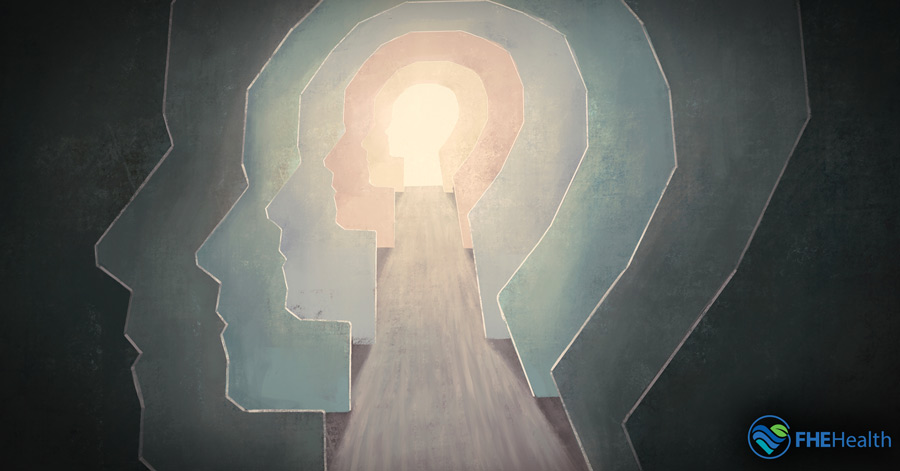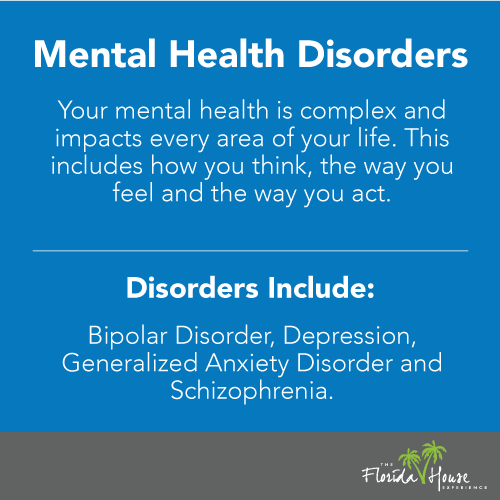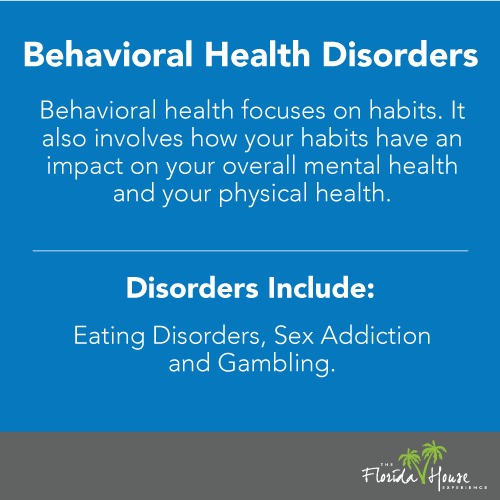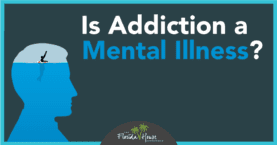
Updated on December 21, 2022
Behavioral health and mental health are two terms often used together to mean the same thing. Yet, they are different. The concept and development of behavioral health services and treatment developed in the 1970s and 1980s but has changed significantly over the last 40 years. It’s important to understand the differences since they can mean something different for each patient. At FHE Health, we provide treatment for both behavioral and mental health needs.
Understanding the Differences in Mental and Behavioral Health
To learn what your needs may be, it’s important to compare mental health and behavioral health from an outside view. Here’s a closer breakdown to give you a starting point:
What Is Mental Health?
 The U.S. federal government’s MentalHealth.gov provides a clear definition of what mental health is. In short, it is the emotional, psychological, and social well-being of a person. Your mental health is complex and impacts every area of your life. This includes how you think, the way you feel and the way you act. A person’s mental health also impacts the decisions they make and how they cope with life changes and stress. It also plays a role in the way you act with other people.
The U.S. federal government’s MentalHealth.gov provides a clear definition of what mental health is. In short, it is the emotional, psychological, and social well-being of a person. Your mental health is complex and impacts every area of your life. This includes how you think, the way you feel and the way you act. A person’s mental health also impacts the decisions they make and how they cope with life changes and stress. It also plays a role in the way you act with other people.
When a person has stable mental health, he or she is able to manage day-to-day stress, interact and contribute to the community, work productively and realize his or her own potential.
Common Mental Health Issues
In any given year, one in five people in the U.S. will experience a mental illness. Some people might struggle with a mental health condition most of or even all of their life. Another person might not experience a mental health disorder until much later in life. For instance, experiencing the death of a spouse or other loved one is bound to cause grief, but prolonged or complicated grief might trigger clinical depression.
There are some common mental health issues that a person might struggle with routinely or occasionally. These may or may not be accompanied by behavioral health issues, but in themselves, they are categorized as mental health disorders.
Depression
Depression is a disorder that leaves an individual feeling persistently sad–even hopeless. It is a mood disorder that can impact a person’s daily life.
Bipolar Disorder
Bipolar disorder is also a mood disorder that is characterized by extreme mood shifts. For months, an individual might experience manic energy and excitement only to be followed by a period of deep depression.
Generalized Anxiety Disorder
Generalized anxiety disorder is a mental illness characterized by persistent unease and worry. A person with anxiety may be prone to periods of fear and panic that impact their day-to-day life.
At their core, these disorders are psychological in nature, although they can entail behavioral health issues. For instance, a person who attempts to “self medicate” away their feelings of depression or anxiety is also potentially dealing with a behavioral health problem.
What Is Behavioral Health?
 “Behavioral health” relates to habits, behaviors, or actions that are impacting mental and physical health. The term also applies to the study of a person’s emotions, biology and behaviors and how they are connected.
“Behavioral health” relates to habits, behaviors, or actions that are impacting mental and physical health. The term also applies to the study of a person’s emotions, biology and behaviors and how they are connected.
Behavioral Health Disorders
Behavioral health conditions are directly or indirectly brought on by the behaviors of the individual. They may come from instances in which a negative force has created a mental or physical condition. In some situations, depression can fall into this area. However, substance abuse is most commonly a behavioral health disorder. Others include eating disorders, sex addiction and gambling.
Common Behavioral Health Disorders
Behavioral health is impacted by psychological health, but the problem–(disorder)–manifests in unhealthy behaviors. Some common behavioral health disorders include:
Eating Disorders
Eating disorders are triggered by mental health issues, but they involve a particular behavior. For instance, a person with anorexia nervosa avoids eating and may work out obsessively. While it’s the unhealthy obsession with body image that drives the disorder, it’s the lack of nourishment and refusing to eat that embody the behavioral aspect of the problem.
Substance Abuse
Substance abuse is a common behavioral health problem. When a person drinks to soothe away symptoms of stress or alleviate symptoms of a mental health issue like depression, they are engaging in an unhealthy act, an act that can pave a path to addiction if the abuse becomes a pattern.
How Mental Health and Behavioral Health Occur Together
In some cases, there is a link between mental health and behavioral health. It is very common, for example, for a patient to have co-occurring disorders, such as a substance abuse disorder and a mental health disorder. Most commonly, behavioral health is associated with some type of unhealthy habit. However, those habits may not be the start of mental health disorders. In some situations, behavioral health disorders can be brought on by underlying and nontreated mental health disorders. Likewise, a person who is stable but has an underlying genetic disposition for mental health disorders may begin to experience mental health complications as a result of substance abuse.
For example, in some situations, individuals may begin drinking alcohol to ease their mind and battle depression. In others, mental health conditions like schizophrenia may cause intense symptoms that may be lessened with the help of substances and drugs. In many situations, individuals end up battling complex conditions because both behavioral health and mental health conditions are present.
Diagnosis and Treatment — The Two Must Be Addressed Together
What becomes even more challenging for men and women who have either a mental health disorder or a behavioral health disorder is that treatment of one without the other results in noneffective outcomes in many cases.
At FHE Health, our team is well-versed in treating co-occurring conditions. Not all treatment centers can offer this. If you or your loved one has or may have an underlying mental health disorder, it’s essential to choose a treatment center capable of providing both layers of care.
Where Diagnosis Starts
Even for trained mental and behavioral health professionals, it can be quite difficult to determine if mental health disorders are present or if an individual is only battling a behavioral health condition. The diagnosis process must involve a comprehensive look back at the individual’s life, the underlying cause of their current health crisis and what their needs are right now. For example, if an individual is struggling with an intense addiction to opioids, the addiction may have started due to dealing with chronic pain. However, looking back further, that pain may have been caused by sexual trauma. In this case, it becomes necessary to treat all aspects of the individual’s health.
How Does Treatment Vary Between Mental Health and Behavioral Health Problems?
One reason why mental and behavioral health seem like interchangeable terms is because treatment is often similar and may even overlap. The ideal treatment, of course, for either problem is to tailor treatment to the individual. Some people may be struggling with a mental health disorder and behavioral health problem at the same time. Dual diagnosis, for instance, which involves the presence of a substance addiction and mental health disorder, affect millions of people.
Generally speaking, though, when treating a mental illness, therapists will necessarily focus more on the individual’s internal psychological and physiological factors. A first-line treatment for depression is prescribing antidepressants that can help restore the chemical balance in the brain, which often alleviates the symptoms of depression.
When treating behavioral health problems, clinicians will certainly focus on psychological factors that govern the negative behaviors, but there’s a strong focus on changing the behaviors by changing the individual’s unhealthy thoughts patterns and emotions. External factors or social factors may also play a role in behavioral health issues, and these also require a treatment focus.
How Does Treatment Vary Between Mental Health and Behavioral Health Problems?
One reason why mental and behavioral health seem like interchangeable terms is because treatment is often similar and may even overlap. The ideal treatment, of course, for either problem is to tailor treatment to the individual. Some people may be struggling with a mental health disorder and behavioral health problem at the same time. Dual diagnosis, for instance, which is the simultaneous presence of a substance addiction and mental health disorder, affects millions of people.
Generally speaking, though, when treating a mental illness, therapists will necessarily focus more on the individual’s internal psychological and physiological factors. For example, antidepressants are a first-line treatment for depression. They help restore the chemical balance in the brain, which often alleviates depressive symptoms.
When treating behavioral health problems, clinicians will certainly focus on psychological factors that govern self-defeating or self-destructive behaviors, but there’s a strong focus on changing the behaviors by changing the individual’s unhealthy thoughts patterns and emotions. External factors or social factors may also play a role in behavioral health issues, and these also require a treatment focus.
What Treatment Options Are Available for Mental Health and Behavioral Health?
Every individual’s needs are very different. When you visit FHE Health, a key component of the care we offer is to provide a personalized treatment plan to address the often complex needs of an individual. This may include treating mental illness and behavioral health at the same time.
Through collaborative care, especially when co-occurring conditions exist, we can help to create a plan that addresses all aspects of an individual’s needs.
- This may include detox from any substances present. Often a first step, it can help to expose any underlying mental health disorders the individual is facing.
- For those who have mental health disorders, a treatment plan may include medications to help stabilize the condition to allow for ongoing treatment and therapy.
- Individuals who have behavioral health disorders alone may need to work through numerous therapy options, both residential and outpatient, to gain a type of treatment that is not based on medication.
Group and individual counseling tend to be key components of treating both mental and behavioral health disorders. Additionally, individuals benefit from holistic care to allow their body — which is generally abused and damaged over the misuse of chemicals or poor management of their mental health disorder — to heal. In all situations, a customized care plan becomes the best possible option.
At FHE Health, we provide advanced care for both components. Co-occurring treatment is an option within our programs, as are holistic treatment, whole-body care, and individualized planning for the future after leaving rehab.









